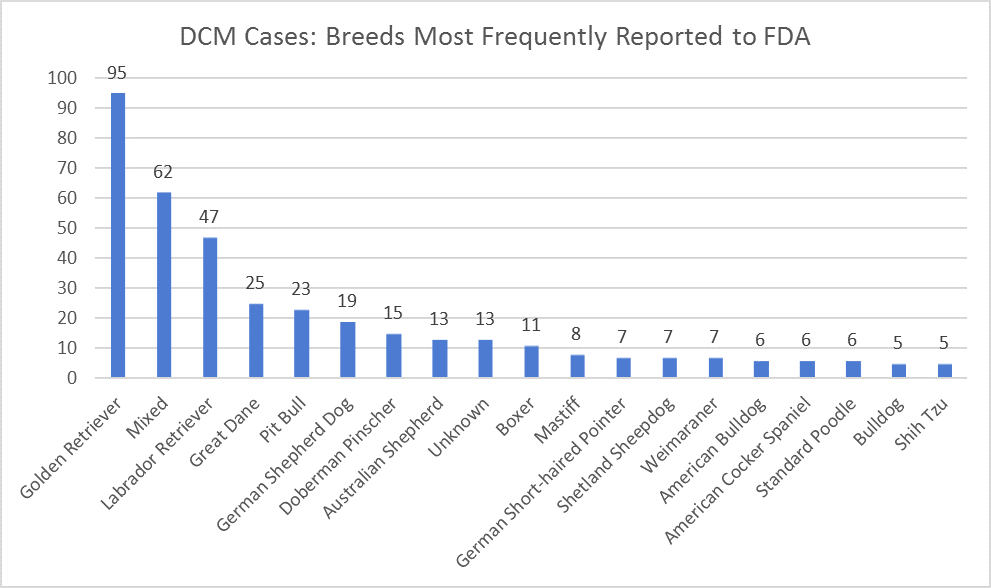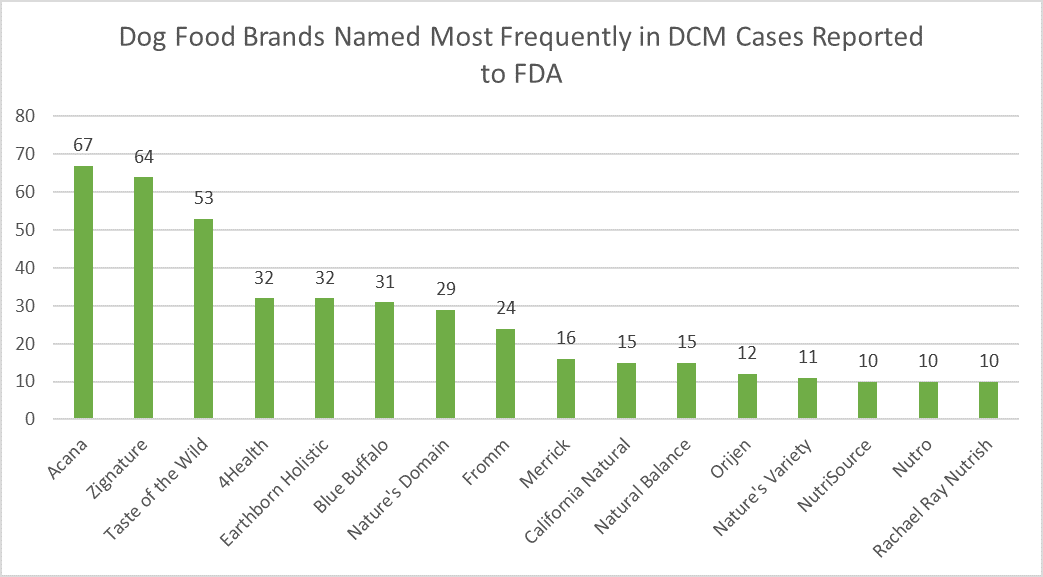FDA Investigating Potential Link Between Diet and Heart Disease in Dogs
DogFoodAdvisor is reader supported See how
Dog Food Advisor is 100% impartial and is never paid to promote any brand. But if you buy using links on this page, we may earn a referral fee.

Original Report July 2018
Updated July 2020
Updated July 2021
Updated February 2022
Updated August 2022
Updated December 2022
Is there a link between DCM in dogs and grain-free dog foods?
On December 23, 2022, the FDA updated its position on potential links between canine dilated cardiomyopathy (DCM) and certain pet foods or pet food ingredients — notably ‘grain-free’ recipes containing high levels of legumes.
It wrote:
“FDA does not intend to release further public updates until there is meaningful new scientific information to share. A count of reports of DCM in dogs submitted to FDA as of November 1, 2022, has been added to Questions & Answers: FDA’s Work on Potential Causes of Non-Hereditary DCM in Dogs. FDA has followed up on a subset of these reports, but is unable to investigate every report to verify or confirm the reported information. While adverse event numbers can be a potential signal of an issue with an FDA regulated product, by themselves, they do not supply sufficient data to establish a causal relationship with reported product(s). FDA continues to encourage research and collaboration by academia, veterinarians, and industry.”
It signals an official pause in one of the biggest and most debated stories in the U.S. pet food industry’s history — one we’ve covered comprehensively on this site.
We get an extraordinary number of emails and comments on this subject. They are not, however, in agreement.
Many people are extremely worried about any potential link, while some are convinced it exists. They are passionate about the subject — unsurprising, given the devastation DCM can cause. Many of those concerned have lost pets to heart disease.
Others, however, are extremely doubtful of any link, with many convinced that there is none. Many manufacturers of grain-free dog food — including small, family-run companies that pride themselves on nutritionally-balanced recipes — are understandably worried about the effects of the story on their business.
There exists online vast amounts of information and disinformation — it’s the way of the world now. We would love to provide a definitive guide on what to believe or not, but we simply do not yet have enough evidence to fall on one side of the argument or the other.
We can only rate dog foods on what we know. It wouldn’t be right to downgrade or condemn a recipe based on something that is currently unproven.
We therefore urge dog parents to use their own judgement. We’ve included as much information and advice on this page as possible, and our dog food reviews are the most comprehensive anywhere, but only you can choose what to feed your dog.
Please read on for more details.
Key Moments
On December 23, 2022, the FDA said that it does not intend to release any further updates on its investigation until there is “meaningful new scientific information”.
On June 27, 2019, the FDA published its third status report regarding a potential connection between grain-free diets and a type of heart disease in dogs known as dilated cardiomyopathy or DCM.
The Agency released a Question and Answer update on July 29, 2021, about the potential non-hereditary causes of DCM.
The Dog Food Advisor initially alerted readers about this issue on July 12, 2018, the day it was first announced by the FDA… and continues to update this report on an ongoing basis.
Still Not Conclusive — No Recalls
Results remain inconclusive and there have been no recalls.
The FDA wrote in June 2019:
“It’s important to note that the reports include dogs that have eaten grain-free and grain containing foods and also include vegetarian or vegan formulations. They also include all forms of diets: kibble, canned, raw and home-cooked.
“Therefore, we do not think these cases can be explained simply by whether or not they contain grains, or by brand or manufacturer.
“… the FDA has received reports about 560 dogs diagnosed with DCM suspected to be linked to diet. Tens of millions of dogs have been eating dog food without developing DCM.”
About DCM
DCM is a disease of a dog’s heart muscle that results in weakened contractions and poor pumping ability, which can lead to an enlarged heart and congestive heart failure.
Although the root cause of DCM remains unknown, and even though initially the condition appeared to be more common in certain breeds, the FDA has received reports of DCM in a wide range of breeds.
Many of these are not genetically prone to the disease.

In its July 29, 2021 update, the FDA added:
Historically, DCM has been primarily linked to a genetic predisposition in certain breeds, but emerging science appears to indicate that non-hereditary forms of DCM occur in dogs as a complex medical condition that may be affected by the interplay of multiple factors such as genetics, underlying medical conditions, and diet. Aspects of diet that may interact with genetics and underlying medical conditions may include nutritional makeup of the ingredients and how dogs digest them, ingredient sourcing, processing, formulation, and/or feeding practices.
Link to Diet?
Since announcing its investigation in July 2018…
FDA researchers have observed that most of these DCM cases were associated with animals eating dry dog foods.
However, dogs eating raw, semi-moist, and wet diets were also affected.
In addition, researchers found that over 90 percent of the reported recipes were grain-free. And yet some dogs consumed diets that contained grain, too.
Which Brands?
Brands named most frequently in these reports are depicted in the graphic. Could the presence of these brands simply be related to their exceptional popularity?
Click here for a more detailed account of all DCM cases reported to the FDA as of April 30, 2019.

The FDA offers the following observation…
“The prevalence of reports in dogs eating a grain-free diet might correlate also to market share: these products have become exceedingly popular over the last several years.”
Taurine Deficiency?
Even though it’s not clear exactly what it is about these diets that may be connected to DCM in dogs, there are a number of possible causes.
For example, Taurine deficiency is a well-documented, potential cause of some cases of DCM. Yet it’s not likely to be the only cause.
In fact, according to Dr. Lisa Freeman, a veterinary nutritionist at Tufts University, “most dogs being diagnosed with DCM do not have low taurine levels”.
This means it’s not reasonable to assume a taurine deficiency is the definitive cause of DCM.
A Common Thread
According to the FDA, researchers have uncovered one dietary feature common to a large number of DCM cases…
“The common thread appears to be legumes, pulses (seeds of legumes), and/or potatoes as main ingredients in the food. This also includes protein, starch and fiber derivatives of these ingredients…
“Some reports… indicate that the pets were not eating any other foods for several months to years prior to exhibiting signs of DCM.
8 Things You Can Do Right Now to Lower Your Dog’s Risk
Until the FDA completes its study and releases its final report, The Dog Food Advisor believes it makes sense to apply science and logic to all your feeding decisions.
So, consider these practical tips:
- Since compared to meat, vegetable protein tends to be incomplete (deficient in certain essential amino acids), you may wish to favor recipes that derive most of their protein from animal sources
- Don’t avoid any recipe just because it contains peas or legumes. Pay attention to the amount, too. The number of suspect items and their relative position on the ingredients list may prove to be more important.
- Favor recipes that don’t list pea protein or other plant protein concentrates among their first few ingredients
- Avoid recipes that use ingredient splitting to hide the fact that their formulas are dominated by plant-based meat protein substitutes
- Confused about grain-free? Consider switching your dog to a quality food that contains grain
- Focus on the recipe. Not the brand. To satisfy consumer demand, companies sometimes replace the meat in certain products with cheaper, plant protein alternatives. Yet many brands still offer other recipes with superior, meat-rich designs
- Don’t put all your eggs in one basket. Diversify. Since no dog food can ever be perfect, consider using diet rotation to lower the risk of endlessly feeding your pet the same imperfect product
- Want more choices? Consider switching your dog’s current diet to one of the many found on our best dog foods lists
The Bottom Line
Results are still not conclusive and so, until we know the answer…
Be patient, don’t overreact.
And don’t be frightened by all the well-meaning yet misguided advice you’ll surely encounter on the Internet. Or the faulty counsel offered by too many uninformed professionals.
Instead…
Base Your Feeding Decisions on Facts… and Science
For the safety and well-being of your pet, the process of choosing dog food must always include:
- An accurate analysis of the dog food label
- A careful evaluation of the company that designs and produces it
- A study of product reviews by real-life users posted at online retailers
In any case, The Dog Food Advisor has never favored any recipe just because it’s grain free.
Nor should you.
Instead…
Our ratings are heavily weighted in favor of our estimate of each recipe’s apparent meat content.
In fact, ratings are automatically reduced anytime we find excessive amounts plant-based protein “boosters” (like peas, legumes or non-meat protein concentrates) too close to the top of any ingredients list.
Finally, many of the very best dog foods on the market are grain free and are made by some of the most respected companies in the USA and Canada.
We’re confident the industry will quickly adapt its recipes to any decisive conclusions reached by the FDA’s future findings.
And of course, we’ll make any relevant adjustments to our content as needed to reflect these scientific findings (once they become available).
In the meantime…
Our Very Best Advice
Since there’s no such thing as a perfect dog food…
And because built-in flaws tend to be magnified when the same food is fed endlessly… day after day for a lifetime.
You may wish to consider diet rotation when feeding your pet.
Most importantly, stay informed.
We can update you the moment the FDA releases its findings.
Get free dog food recall alerts sent to you by email. Subscribe to The Dog Food Advisor’s emergency recall notification system.
Important Update July 3, 2020
It appears the FDA may have been premature in warning the public about the possible link between DCM and grain-free diets.
In a June 22, 2020, Petfood Industry article, entitled “DCM Study: no link to grain-free pet food, no closure”, editor-in-chief, Debbie Phillips-Donaldson, writes…
“The study published June 15 in the Journal of Animal Science and conducted by veterinarians, veterinary cardiologists and animal nutritionists at consultancy BSM Partners, was a literature review comprising more than 150 previous studies on canine nutrition and its relationship to DCM.
“The first paragraph of the authors’ conclusion is worth quoting in full:
“Recently, a correlation between diets with specific characteristics, such as, but not limited to, containing legumes, grain-free, novel protein sources and ingredients, and smaller manufactured brands, to DCM has come under scrutiny by academic researchers and FDA. The use of the acronym “BEG” and its association with DCM are without merit because there is no definitive evidence in the literature. At this time, information distributed to the veterinary community and the general public has been abbreviated synopses of case studies, with multiple variables and treatments, incomplete medical information and conflicting medical data and opinions from veterinary nutrition influencers. Also, in past literature, sampling bias, overrepresentation of subgroups and confounding variables in the data weaken this hypothesis. Additionally, based on current literature, the incidence of DCM in the overall dog population is estimated to be between 0.5% and 1.3% in the United States. However, the FDA case numbers (560 dogs) are well below the estimated prevalence. Therefore, it is impossible to draw any definitive conclusions, in these cases, linking specific diets or specific ingredients to DCM.”
“In summary, no scientific research provides proof of a link between DCM and specific types of pet food, or even the “BEG” (boutique, exotic protein and grain free) term invented by some veterinarians; the case studies, data and other information related to the DCM cases in the FDA investigation are not at all complete and, in some cases, even conflict; and previous studies related to DCM have research problems that “weaken this hypothesis” of a correlation between DCM and specific types of pet foods.”
July 2021 Update
In its July 29, 2021 update, the FDA wrote:
Most of the diets associated with the reports of non-hereditary DCM have legume seed ingredients, also called “pulses” (e.g., peas, lentils, etc.), high in their ingredient lists (although soy is a legume, we did not see a signal associated with this ingredient). These include both “grain-free” and grain-containing formulations. Legumes, including pulse ingredients, have been used in pet foods for many years, with no evidence to indicate they are inherently dangerous, but analysis of data reported to CVM indicates that pulse ingredients are used in many “grain-free” diets in greater proportion than in most grain-containing formulas. FDA has asked pet food manufacturers to provide diet formulations so we can further understand the proportions of ingredients in commercially-available diets and possible relationships with non-hereditary DCM.
The FDA does not know the specific connection between these diets and cases of non-hereditary DCM and is continuing to explore the role of genetics, underlying medical conditions, and/or other factors.
February 2022 Update
The controversy continues.
In the beginning, many scientists believed DCM was caused by deficient dietary taurine. Until that theory was disproven.
Then, DCM was supposedly caused by boutique diets.
But now, some are convinced that DCM is caused by the mere presence of peas in a food.
What about the dose? Shouldn’t the amount matter, too?
FDA reps report affected animals “had eaten diets high in peas, lentils, or both”.
Shouldn’t concerns about peas and other legumes also focus on the amount and mix ratios of these ingredients? Should dried pea protein (a plant-based protein concentrate) be treated the same as small amounts of peas in a food?
There are still so many questions to answer.
The jury is still out.
So…
Before you decide what action to take, we still believe it’s worth waiting for more definitive guidance from the FDA.
Until then, if you’re still concerned…
Consider choosing one of the many grain-inclusive options on our “Best Dog Foods” pages. We provide a mixture of both grain-free and grain-inclusive recipes on every list.
That way, you can choose the type of foods you trust… and avoid the ones you don’t.
Or follow our recommendations about the benefits of diet rotation. By periodically switching dog foods, you can minimize the unhealthy consequences of serving imperfect products.
Did Industry Funding Influence the Investigation?
August 2022 Update — Did industry funding influence the FDA investigation into canine heart disease and grain-free dog food?
An extensive report conducted by investigative journalists found potential conflict of interest in the studies associated with this subject.
“In 2018, the U.S. Food and Drug Administration, acting on input from a group of veterinary researchers, began investigating whether the increasing popularity of grain-free dog foods had led to a sudden rise in a potentially fatal heart disease in dogs, dilated cardiomyopathy.
“Four years later, the FDA has found no firm link between diet and dilated cardiomyopathy. Nor has it rejected such a link, and the research is ongoing. Publicity surrounding the suspected link, nevertheless, has driven down the once-promising market for grain-free dog foods.
“Furthermore, a tangled web of pet food industry funding and interests may have influenced the origin, data collection and course of the FDA study, according to an examination of internal FDA records and extensive reporting.
“A six-month investigation by 100Reporters has found that veterinarians who prompted the FDA to consider diet have financial and other ties to the leading sellers of grain-inclusive pet foods. Additionally, agency records show that for the initial study, some vets were instructed to submit only dilated cardiomyopathy (DCM) cases that implicated grain-free, “exotic” or “boutique” pet foods. Suppliers of ingredients used in grain-free dog foods have also exerted pressure on the FDA to protect their market.”
Read the extensive report here
Further Reading
In the meantime, take the time to read this growing list of controversial articles and references.
Questions & Answers: FDA’s Work on Potential Causes of Non-Hereditary DCM in Dogs
DCM and grain-free pet foods: 3 strikes and you’re out!
Investigation of diets associated with dilated cardiomyopathy in dogs using foodomics analysis
Foodomics study not meant to link peas in dog food to DCM
Grain-free diet not linked to DCM in dogs, research review finds
Study identifies differences in DCM-associated diets
Review of canine dilated cardiomyopathy in the wake of diet-associated concerns
Related Reading
The following pages contain a selection of dog foods that are made with and without grain.
Final word
The Dog Food Advisor does not accept money, gifts, samples or other incentives in exchange for special consideration in preparing our reviews.
However, we do receive a referral fee from online retailers (like Chewy or Amazon) and from sellers of perishable pet food when readers click over to their websites from ours. This helps cover the cost of operation of our free blog. Thanks for your support.
For more information, please visit our Disclaimer and Disclosure page.






